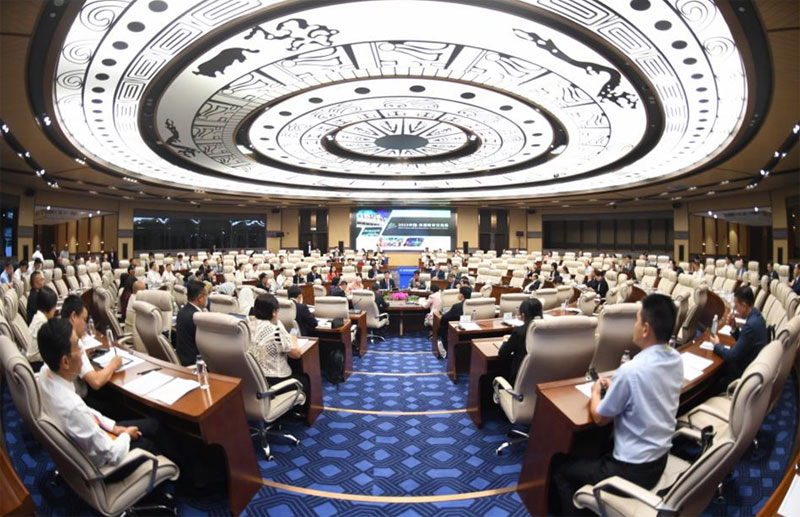
The ASEAN-China Centre (ACC) held the Education Policy Roundtable jointly with the Southeast Asian Ministers of Education Organization (SEAMEO) and other partners during the 2023 China-ASEAN Education Cooperation Week (2023 CAECW). With the theme of “Consolidating the Promising Prospect for ASEAN-China Education Cooperation, Serving Closer Comprehensive Strategic Partnership”, the forum invited representatives from ASEAN Member States (AMS), Chinese education authorities and international organizations to share views on high-quality promotion of ASEAN-China education cooperation.
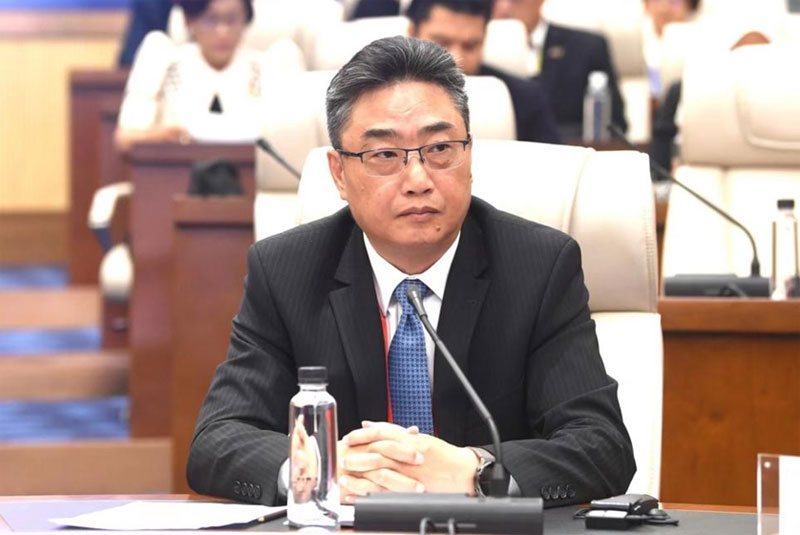
H.E. Secretary General Shi Zhongjun of the ACC addressed the forum. He emphasized that with the recovery of international exchanges after the epidemic, ASEAN and China are increasingly enthusiastic about cooperation in education. The purpose of this forum is to advance the exchange of higher education and vocational education policies and support more targeted cooperation among all parties. The ACC is committed to act as the advocator, bridge and facilitator, so as to consolidate practical cooperation in education between ASEAN and China, strengthening the comprehensive strategic partnership.
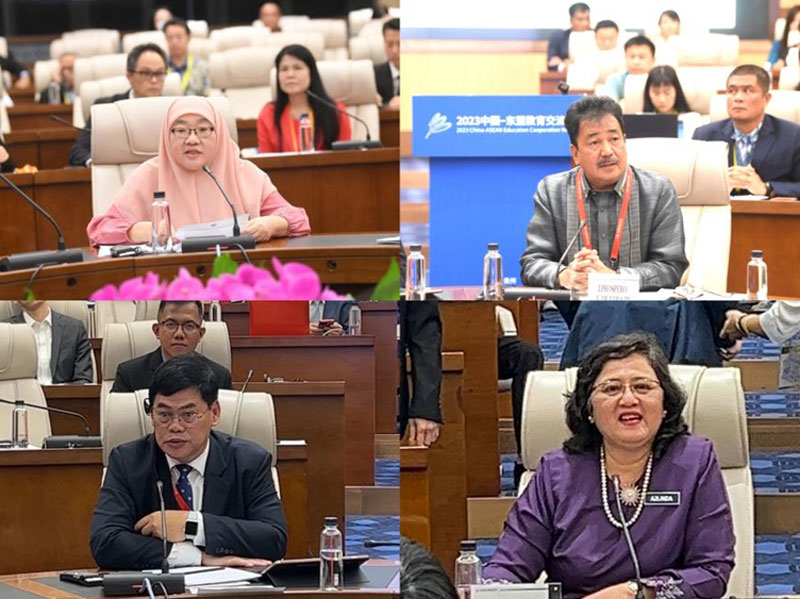
Dr. Habibah binti Abdul Rahim, Director of SEAMEO, introduced that SEAMEO has established 26 regional centers focusing on regional cooperation and development in the fields of higher education, vocational education, language and culture, science and technology, and looks forward to fostering regional cooperation in education, science and culture with China and AMS through networks, exchanges, personnel training and related projects.
Dr. J. Prospero de Vera III, Chairman of the Commission on Higher Education (CHED) of the Philippines, noted that the epidemic has brought challenges to the development of higher education in the Philippines. At present, CHED is committed to continuously enhancing the sustainable and international development of Philippine higher education, and hopes to strengthen policy exchanges and cooperation with China in the fields of education digitization, cooperative education, Chinese language education and personnel training.
Dr. Om Romny, Secretary of State of Ministry of Education, Youth and Sports of Cambodia, shared that Cambodia is committed to continuously improving the quality of education supply, application of digital technology and Chinese language teaching in the Cambodian education system, and support the development of young people. Cambodia hopes to strengthen exchanges and cooperation with China and AMS.
Prof. Dr. Azlinda binti Azman, Director General of Higher Education Ministry of Malaysia, said that with more than 100,000 international students, Malaysia is committed to achieving global prominence in higher education by 2025. The Ministry of Higher Education therefore has actively signed MOUs with other countries and promoted exchange of academic staff and students, academic research, industry-university-research and other projects, so as to build a solid higher education brand, and looks forward to strengthening further cooperation with China.
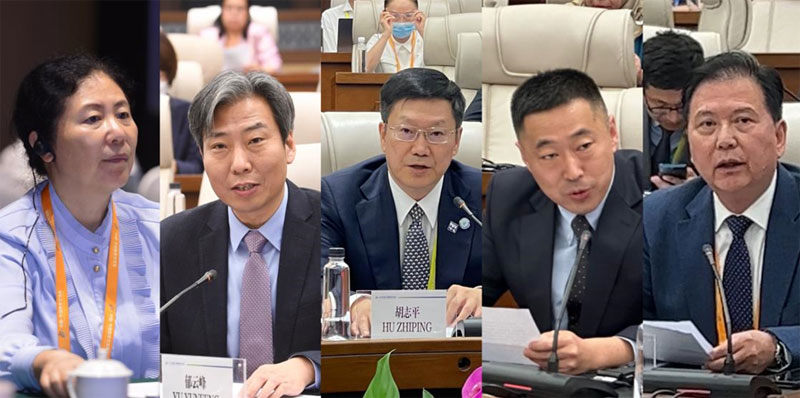
Deputy Director General Hu Zhiping of Center for Language Education and Cooperation (CLEC) noted that with the deepening of ASEAN-China comprehensive strategic partnership, people in AMS have a strong demand for learning Chinese. In recent years, through the formulation of standards, the online platform of the Chinese Plus, and the “Chinese + TVET” project, the CLEC has built a comprehensive Chinese education service system integrating Center for Chinese Language and Professional Skills, teachers, textbooks, tests, scholarships, “Chinese Bridge” competition and cultural visits. CLEC will continue to support the development of Chinese language education in AMS.
Secretary General Yu Yufeng of China Education Association for International Exchange (CEAIE) introduced that CEAIE has carried out in-depth cooperation with AMS in vocational education, language and culture, youth exchanges, teacher training and standard building. For example, CEAIE built an ASEAN-China TVET Flagship Program and Association, actively promoted the construction of Luban Workshop, held the China International Education Annual Conference and China-ASEAN Language and Culture Forum, constantly enhancing educational exchanges and cooperation with AMS.
Deputy Director General Li Xiaozhe of Chinese Service Center for Scholarly Exchange (CSCSE) shared that CSCSE has continuously upgraded the level of ASEAN-China education cooperation through overseas credential evaluation, two-way student exchanges, talent training, and high-quality activities for AMS students in China. It is expected that students from AMS will account for one quarter of the total number of new students coming to China from all over the world this year. Post-epidemic education exchanges between the two sides have shown strong vitality and promising prospects.
Ms. Wang Hui, Chair of the Union of Guizhou Department of Education introduced the important role of education internationalization in Guizhou’s economic and social development, and commented that since the CAECW has been held in Guizhou for 16 years, it has successfully promoted the practical cooperation between Guizhou, AMS and other Belt and Road countries in talent cultivation, cooperative scientific research, personnel exchanges and other aspects. Guizhou looks forward to expanding communication channels and cooperation platforms through CAECW to promote mutual learning and win-win cooperation.
President Huang Kan of Beijing Education Association for International Exchange expressed the hope to make full use of Beijing’s educational resources and scientific research advantages to deepen cooperation between Beijing and AMS in education cooperation mechanism building, vocational education resource sharing, international integration of industry and education and digital education.
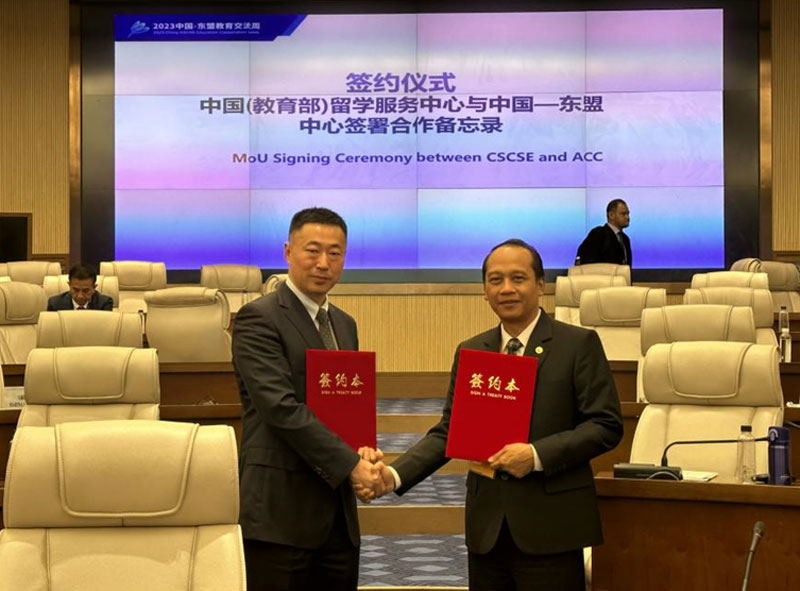
During the roundtable, an MOU was signed among the ACC,CSCSE and Department of Education of Guizhou Province. The ACC NetEdu Concept Note was issued. More than 200 university presidents and representatives from 17 countries and regions along ASEAN and the Belt and Road participated in the meeting.